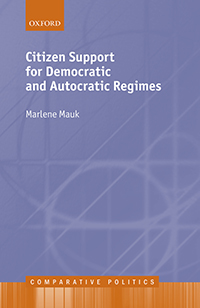Install the app
Install this application on your home screen for quick and easy access when you’re on the go.
Just tap then “Add to Home Screen”
Install this application on your home screen for quick and easy access when you’re on the go.
Just tap then “Add to Home Screen”
Install this application on your home screen for quick and easy access when you’re on the go.
Just tap then “Add to Home Screen”
New in the Oxford University Press / ECPR Comparative Politics Series is Citizen Support for Democratic and Autocratic Regimes by Marlene Mauk
 About the book
About the bookThis book offers a political-culture perspective on the struggle between democracy and autocracy by examining how these regimes fare in the eyes of their citizens.
Taking a globally comparative approach, it studies the levels as well as the individual- and system-level sources of political support in democracies and autocracies worldwide.
Marlene Mauk develops an explanatory model of regime support which includes both individual- and system level determinants and specifies not only the general causal mechanisms and pathways through which these determinants affect regime support but also spells out how these effects might vary between the two types of regimes.
The book empirically tests its propositions using multi-level structural equation modelling and a comprehensive dataset that combines recent public-opinion data from six cross-national survey projects with aggregate data from various sources for more than 100 democracies and autocracies.
It finds that the levels and individual-level sources of regime support are the same in democracies and autocracies, but that the way in which system-level context factors affect regime support differs between the two types of regimes.
The results enhance our understanding of what determines citizen support for fundamentally different regimes, help assess the present and future stability of democracies and autocracies, and provide clear policy implications to those interested in strengthening support for democracy and/or fostering democratic change in autocracies.
 “This book has been in the making for a very long time. It started out as a project on political support in autocracies in Southeast Asia, but I soon realised that the conclusions I wanted to draw about the formation of regime support and the role individual- and system-level sources play in this process were more general. It thus became clear to me that I had to go global as well as include democracies in my theoretical framework and empirical analysis.
“This book has been in the making for a very long time. It started out as a project on political support in autocracies in Southeast Asia, but I soon realised that the conclusions I wanted to draw about the formation of regime support and the role individual- and system-level sources play in this process were more general. It thus became clear to me that I had to go global as well as include democracies in my theoretical framework and empirical analysis.
While I initially set out expecting systematic differences between democracies and autocracies along every step in the formation of regime support, the first results already showed that – what in retrospect seems quite obvious – individual-level processes function pretty much the same way regardless of regime context. When it comes to how they view their political regime, people tend to value the same things everywhere: overlap with their own values, having political rights, economic performance, feeling safe, and incumbents they can approve of.
The core systematic difference between democracies and autocracies is thus located in the way system-level contexts are translated into individual-level attitudes in the first place. There still is a lot of work to be done in order to fully comprehend how attitude-formation processes are distorted by autocratic indoctrination and propaganda; I hope that my book can be a first step in understanding the fundamental differences between democratic and autocratic regimes."
Marlene Mauk is a research associate in political science at GESIS-Leibniz Institute for the Social Sciences, Cologne. She holds a PhD in comparative politics from Mainz University and has previously worked there as a researcher and lecturer at the Department of Political Science. Her research interests lie in the field of political culture, with a focus on the comparison between democracies and autocracies; among other topics, she studies political trust and its sources, political value orientations, and various aspects of democratic quality.
 ► Browse the full list of ECPR / OUP Comparative Politics titles
► Browse the full list of ECPR / OUP Comparative Politics titlesKeywords: Democracy